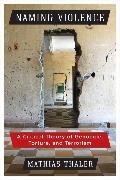Description
Product details
| Authors | Mathias Thaler, Professor Mathias Thaler |
| Publisher | Columbia University Press |
| Languages | English |
| Product format | Hardback |
| Released | 31.10.2018 |
| EAN | 9780231188142 |
| ISBN | 978-0-231-18814-2 |
| No. of pages | 248 |
| Series |
New Directions in Critical Theory New Directions in Critical The New Directions in Critical Theory |
| Subjects |
Humanities, art, music
> Philosophy
> General, dictionaries
Non-fiction book > History > Miscellaneous PHILOSOPHY / Political, POLITICAL SCIENCE / Terrorism, POLITICAL SCIENCE / Genocide & War Crimes, Social & political philosophy, Political science & theory, social and political philosophy, Terrorism, armed struggle, Political science and theory, Genocide & ethnic cleansing, Genocide and ethnic cleansing |
Customer reviews
No reviews have been written for this item yet. Write the first review and be helpful to other users when they decide on a purchase.
Write a review
Thumbs up or thumbs down? Write your own review.

